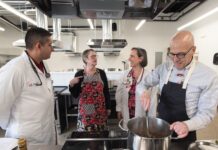
A documentary that aired recently on HBO’s VICE News showcased the journey of a young patient who lost her life to opioid addiction. The patient was treated at UofL Hospital.
The documentary looks at the “silver lining” of the crisis — a record-high uptick of organs available for donation.
“I didn’t know she wanted to be a donor. I was so glad. I was so proud of her,” the patient’s mom, Jane Tyler, said in the documentary. “The hospital fought so hard to save her life. It just wasn’t meant to be.”
Jane’s daughter Kristen was 38 when she died of an overdose in Louisville.
When an overdose victim has chosen to be an organ donor, medical personnel have to work quickly to preserve the health of the organs. If they’re suitable, the local organ procurement organization steps in to locate recipients. In some cases, organs are compromised but still viable.
Dr. Glen Franklin, with the UofL School of Medicine and medical director of the Kentucky Organ Donor Affiliates, said the opioid epidemic in Kentucky started to hit about three to four years ago, and emergency rooms in the region experienced a 500-to-600-percent increase in patients.
Like many opioid victims, Kristen’s organs were compromised, but the staff at UofL Hospital was able to allocate her liver and kidneys.
Dr. Christopher Jones, director of the Transplant Center at UofL, said recipients are often concerned about whether they will become a drug addict if they take a deceased patient’s organs, but that is not the case.
“If a high risk organ becomes available for me, say a kidney, and I’ve been going to dialysis for however many years, three times a week for four hours a day, you better believe I’m taking that organ,” Jones said.
Because there is now a cure for Hepatitis C, most programs are using these organs without hesitancy. Five years ago, that wasn’t the case.
Sharon Minor was the recipient of Kristen Tyler’s kidney. The transplant took place in Virginia.
“If I could speak to the family that was the donor, I would just give them a big hug. There are no words to express how I feel,” she said. “I’m grateful to be alive.”
Check out the footage from the documentary, including from UofL Hospital:































